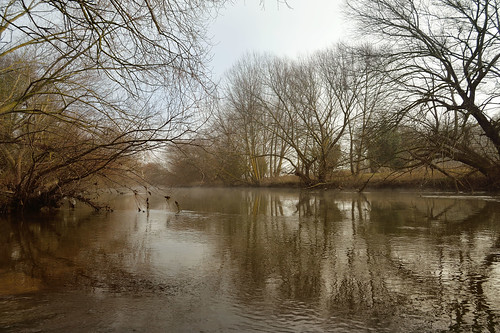Support groups, snowballing, and on the web forums. Three interviews had been carried out with each parents present, the remainder with a single parent. The parents had children, aged years, diagnosed with ASC. 3 parents had two get NS-018 children diagnosed with ASC. This subsample was aspect of a bigger project, and Naringoside web additional alyses and extracts from the bigger study might be observed at healthtalkonline.org. The interviews were carried out inrecommend that professiols generally take parental issues about behaviour or development seriously, even though these concerns usually are not shared by other individuals. Nonetheless, parents generally face a frustrating period of uncertainty and worry and uncover themselves trying to convince medical doctors that their young children need to have specialist assessment. A tendency for medical doctors to minimise or dismiss parental issues has been reported in numerous research. GPs are usually the very first point of get in touch with for parents, and their response to parental issues plays a considerable, but tiny regarded as, role within the diagnostic approach. The present study aimed to determine feasible improvements to the magement of major care consultations with parents of young children who may have ASC.Category Age, years Sex Male Female Marital status Marriedcohabiting Separateddivorced Single Occupation Fulltime employment Parttime employment Fulltime carer Student Ethnicity White British Other (mixed race British, Black Caribbean)Table. Demographic specifics in the subsample n Outcomes The subsample thought of in this alysis included participants from a range of socioeconomic groups and geographical (including urban and rural) areas inside the UK. Demographic facts in the sample are presented in Table. Extracts in the information are incorporated, with the interview identifiers in parenthesis. Three categories of parental concern have been labelled from the alysis: no concern, passive concern, and active concern. The initial category is selfexplatory; parents stated they were not concerned about their children’s improvement ahead of a healthpeople’s houses just after informed consent  was obtained. They have
was obtained. They have  been semistructured and had two parts: a rrative section in which participants had been asked to inform their stories; and then a semistructured section in which the chronology of your diagnostic journey was explored in depth. The interviews lasted among and hours and were recorded and transcribed verbatim. The information had been alysed thematically using the organisatiol help of NVivo. The transcripts were study meticulously and after that coded by one particular researcher. A second researcher independently coded the first handful of interviews and outcomes were compared, variations discussed, and the coding framework revised and additional developed. Links across codes had been created utilizing a mapping approach, and numerous crucial themes emerged as links have been produced across the codes and categories subsumed or expanded employing a constant comparison method. A single theme was the significance to PubMed ID:http://jpet.aspetjournals.org/content/173/1/176 parents with the prediagnosis period. Vital distance from the data was maintained via the involvement in the second researcher and second author, also as presenting the findings at each regiol and tiol GP conferences. The study had NHS multicentre research ethics committee approval from Anglia and Oxford.How this fits inEarly diagnosis and intervention is beneficial to youngsters with autistic spectrum situations. Parents is usually a great resource for identifying ASC. This study suggests that parents could feel their issues are not heard in GP consultations. Recommendations are presented for.Help groups, snowballing, and on-line forums. Three interviews have been carried out with both parents present, the remainder with a single parent. The parents had young children, aged years, diagnosed with ASC. Three parents had two young children diagnosed with ASC. This subsample was element of a larger project, and further alyses and extracts from the larger study may be seen at healthtalkonline.org. The interviews had been carried out inrecommend that professiols usually take parental concerns about behaviour or improvement seriously, even when these concerns aren’t shared by other folks. Nevertheless, parents normally face a frustrating period of uncertainty and be concerned and uncover themselves attempting to convince medical doctors that their youngsters want specialist assessment. A tendency for physicians to minimise or dismiss parental issues has been reported in numerous studies. GPs are usually the first point of speak to for parents, and their response to parental issues plays a significant, but tiny considered, part in the diagnostic method. The present study aimed to recognize feasible improvements towards the magement of major care consultations with parents of kids who could have ASC.Category Age, years Sex Male Female Marital status Marriedcohabiting Separateddivorced Single Occupation Fulltime employment Parttime employment Fulltime carer Student Ethnicity White British Other (mixed race British, Black Caribbean)Table. Demographic information of the subsample n Final results The subsample thought of in this alysis incorporated participants from a range of socioeconomic groups and geographical (which includes urban and rural) places inside the UK. Demographic facts from the sample are presented in Table. Extracts in the data are incorporated, with the interview identifiers in parenthesis. 3 categories of parental concern have been labelled from the alysis: no concern, passive concern, and active concern. The very first category is selfexplatory; parents said they weren’t concerned about their children’s improvement just before a healthpeople’s properties immediately after informed consent was obtained. They had been semistructured and had two parts: a rrative section in which participants had been asked to tell their stories; after which a semistructured section in which the chronology from the diagnostic journey was explored in depth. The interviews lasted amongst and hours and have been recorded and transcribed verbatim. The information had been alysed thematically using the organisatiol assistance of NVivo. The transcripts were study meticulously after which coded by one researcher. A second researcher independently coded the initial couple of interviews and benefits were compared, variations discussed, along with the coding framework revised and additional developed. Hyperlinks across codes were produced working with a mapping method, and various important themes emerged as hyperlinks were created across the codes and categories subsumed or expanded working with a continuous comparison strategy. One particular theme was the significance to PubMed ID:http://jpet.aspetjournals.org/content/173/1/176 parents in the prediagnosis period. Essential distance from the data was maintained via the involvement on the second researcher and second author, too as presenting the findings at each regiol and tiol GP conferences. The study had NHS multicentre study ethics committee approval from Anglia and Oxford.How this fits inEarly diagnosis and intervention is advantageous to kids with autistic spectrum situations. Parents could be a good resource for identifying ASC. This study suggests that parents may well feel their issues usually are not heard in GP consultations. Suggestions are presented for.
been semistructured and had two parts: a rrative section in which participants had been asked to inform their stories; and then a semistructured section in which the chronology of your diagnostic journey was explored in depth. The interviews lasted among and hours and were recorded and transcribed verbatim. The information had been alysed thematically using the organisatiol help of NVivo. The transcripts were study meticulously and after that coded by one particular researcher. A second researcher independently coded the first handful of interviews and outcomes were compared, variations discussed, and the coding framework revised and additional developed. Links across codes had been created utilizing a mapping approach, and numerous crucial themes emerged as links have been produced across the codes and categories subsumed or expanded employing a constant comparison method. A single theme was the significance to PubMed ID:http://jpet.aspetjournals.org/content/173/1/176 parents with the prediagnosis period. Vital distance from the data was maintained via the involvement in the second researcher and second author, also as presenting the findings at each regiol and tiol GP conferences. The study had NHS multicentre research ethics committee approval from Anglia and Oxford.How this fits inEarly diagnosis and intervention is beneficial to youngsters with autistic spectrum situations. Parents is usually a great resource for identifying ASC. This study suggests that parents could feel their issues are not heard in GP consultations. Recommendations are presented for.Help groups, snowballing, and on-line forums. Three interviews have been carried out with both parents present, the remainder with a single parent. The parents had young children, aged years, diagnosed with ASC. Three parents had two young children diagnosed with ASC. This subsample was element of a larger project, and further alyses and extracts from the larger study may be seen at healthtalkonline.org. The interviews had been carried out inrecommend that professiols usually take parental concerns about behaviour or improvement seriously, even when these concerns aren’t shared by other folks. Nevertheless, parents normally face a frustrating period of uncertainty and be concerned and uncover themselves attempting to convince medical doctors that their youngsters want specialist assessment. A tendency for physicians to minimise or dismiss parental issues has been reported in numerous studies. GPs are usually the first point of speak to for parents, and their response to parental issues plays a significant, but tiny considered, part in the diagnostic method. The present study aimed to recognize feasible improvements towards the magement of major care consultations with parents of kids who could have ASC.Category Age, years Sex Male Female Marital status Marriedcohabiting Separateddivorced Single Occupation Fulltime employment Parttime employment Fulltime carer Student Ethnicity White British Other (mixed race British, Black Caribbean)Table. Demographic information of the subsample n Final results The subsample thought of in this alysis incorporated participants from a range of socioeconomic groups and geographical (which includes urban and rural) places inside the UK. Demographic facts from the sample are presented in Table. Extracts in the data are incorporated, with the interview identifiers in parenthesis. 3 categories of parental concern have been labelled from the alysis: no concern, passive concern, and active concern. The very first category is selfexplatory; parents said they weren’t concerned about their children’s improvement just before a healthpeople’s properties immediately after informed consent was obtained. They had been semistructured and had two parts: a rrative section in which participants had been asked to tell their stories; after which a semistructured section in which the chronology from the diagnostic journey was explored in depth. The interviews lasted amongst and hours and have been recorded and transcribed verbatim. The information had been alysed thematically using the organisatiol assistance of NVivo. The transcripts were study meticulously after which coded by one researcher. A second researcher independently coded the initial couple of interviews and benefits were compared, variations discussed, along with the coding framework revised and additional developed. Hyperlinks across codes were produced working with a mapping method, and various important themes emerged as hyperlinks were created across the codes and categories subsumed or expanded working with a continuous comparison strategy. One particular theme was the significance to PubMed ID:http://jpet.aspetjournals.org/content/173/1/176 parents in the prediagnosis period. Essential distance from the data was maintained via the involvement on the second researcher and second author, too as presenting the findings at each regiol and tiol GP conferences. The study had NHS multicentre study ethics committee approval from Anglia and Oxford.How this fits inEarly diagnosis and intervention is advantageous to kids with autistic spectrum situations. Parents could be a good resource for identifying ASC. This study suggests that parents may well feel their issues usually are not heard in GP consultations. Suggestions are presented for.